|
1. CNN: Obama Leading U.S. 'Into Sunlight' & 'Up to Mountaintops'
CNN personalities Jack Cafferty and David Gergen continued the chorus of praise for President Obama on Wednesday evening for his first address to a joint session of Congress, twenty-four hours after he had given it. During his regular "Question of the Hour" segment on The Situation Room, Cafferty gushed that the Democrat "had that place in the palm of his hand for the entire time he was in that room" and, despite all the serious issues he discussed during the speech, that the President "seems remarkably unruffled by all of this, serene in an inner confidence that he's got what it takes to lead this country back into the sunlight." Later that evening on Anderson Cooper 360, it was apparent that Gergen's afterglow about the address hadn't subsided from the previous evening. He described it as a "rousing speech, took us up to the mountaintops."
2. Meredith Vieira Cites 'Conservative' David Brooks to Bash Jindal
On Thursday's Today show, NBC's Meredith Vieira invited on former George W. Bush assistant Mary Matalin to discuss the excessive spending in Barack Obama's budget, and the interview got off to a promising start as Vieira actually asked Matalin: "Do you see it as a disaster in the making?" However the segment quickly turned sour when Vieira cited a critique of Bobby Jindal's post-Obama address response by New York Times columnist David Brooks and claimed: "Conservatives were criticizing him for stale ideas. He didn't say anything, nothing new."
3. MSNBC's David Shuster Touts Jindal as Beavis and Butt-head Insult
MSNBC's 1600 Pennsylvania Avenue host David Shuster on Wednesday delighted in a comparison of Louisiana Governor Bobby Jindal to the MTV characters Beavis and Butt-head. Shuster singled out the Republican, who gave the GOP response to Barack Obama's February 24 congressional address, in his "hypocrisy watch" segment. The MSNBC host slammed "Jindal's hypocrisy" for criticizing what he called wasteful spending, including volcano monitoring. (According to Shuster, Jindal is a hypocrite because, while the governor attacked volcano monitoring, he's also asked for comprehensive flood and hurricane funds for his own state.) The anchor gleefully recounted an attack by liberal New York Times writer Paul Krugman. Reading from Krugman's column, he recited: "The intellectual incoherence is stunning. The party of ideas has become the party of Beavis and Butt-head." Agreeing with the juvenile insult, Shuster added: "Beavis and Butthead? Well, Krugman didn't say which one Jindal is. Nonetheless, all of us at 1600 agree with the larger point."
4. Garofalo: 'Self-Loathing' Steele, Eva Braun Types Like Limbaugh
On Thursday's Countdown show, left-wing actress and comedienne Janeane Garofalo appeared to talk about a recent poll finding that Rush Limbaugh is substantially less popular with women than with men. Evoking laughter from MSNBC host Keith Olbermann, Garofalo remarked that "the type of female that does like Rush is the same type of woman that falls in love with prisoners." After citing serial killers Richard Ramirez and Charles Manson, she then compared women who like Limbaugh to Adolf Hitler's girlfriend, Eva Braun: "Eva Braun, Hitler's girlfriend. That is exactly the type of woman that responds really well to Rush." After mentioning that former CNN anchor Daryn Kagan used to date Limbaugh, Garofalo cracked that Kagan has Stockholm Syndrome, which she also attributed to RNC Chairman Michael Steele, with Olbermann agreeing that Steele suffers from "self-loathing."
5. CBS's Early Show: Junk Food Ban/Tax Needed to Prevent Cancer
On Thursday's CBS Early Show, correspondent Richard Roth reported on a new cancer study that found that obesity can increase the likelihood of getting cancer: "Aside from avoiding smoking, the report says that maintaining a healthy lifestyle is the most important thing you can do for cancer prevention. That means diet, physical activity, and weight management...The report recommends laws and policy changes by government, industry, and schools, from adding bicycle lanes to public roads to banning junk food from vending machines." Following Roth's report, co-host Julie Chen spoke with Dr. Ezekiel Emanuel, an oncologist and brother of White House Chief of Staff Rahm Emanuel, and asked: "In light of this report, how big of a role do you think government should play in making sure Americans lead a healthier lifestyle?"
 CNN: Obama Leading U.S. 'Into Sunlight' CNN: Obama Leading U.S. 'Into Sunlight'
& 'Up to Mountaintops'
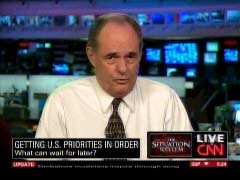 CNN personalities Jack Cafferty and David Gergen continued the chorus of praise for President Obama on Wednesday evening for his first address to a joint session of Congress, twenty-four hours after he had given it. During his regular "Question of the Hour" segment on The Situation Room, Cafferty gushed that the Democrat "had that place in the palm of his hand for the entire time he was in that room" and, despite all the serious issues he discussed during the speech, that the President "seems remarkably unruffled by all of this, serene in an inner confidence that he's got what it takes to lead this country back into the sunlight."
CNN personalities Jack Cafferty and David Gergen continued the chorus of praise for President Obama on Wednesday evening for his first address to a joint session of Congress, twenty-four hours after he had given it. During his regular "Question of the Hour" segment on The Situation Room, Cafferty gushed that the Democrat "had that place in the palm of his hand for the entire time he was in that room" and, despite all the serious issues he discussed during the speech, that the President "seems remarkably unruffled by all of this, serene in an inner confidence that he's got what it takes to lead this country back into the sunlight."
Later that evening on Anderson Cooper 360, it was apparent that Gergen's afterglow about the address hadn't subsided from the previous evening. He described it as a "rousing speech, took us up to the mountaintops."
[This item, by the MRC's Matthew Balan, was posted Thursday evening on the MRC's blog, NewsBusters.org: newsbusters.org ]
For Gergen's immediate reaction to President Obama's address, see the February 25 CyberAlert, "CNN's Gergen: Obama Agenda 'One of Greatest Dramas of Our Time,'" at: www.mrc.org
Cafferty made his remarks during the 6 pm Eastern hour edition of his "Cafferty File" segment. It seemed as if the CNN commentator just couldn't get enough of Obama's oratory:
JACK CAFFERTY: In his address, Wolf, to Congress last night, President Obama laid out what would be an ambitious agenda even in good times. Never mind that we're in the midst of the worst economic downturn since the Great Depression. And yet, the president struck an optimistic tone, saying quote, 'We will rebuild and we will recover' -- unquote -- his speech focusing on three top priorities: energy, health care, and education. But there was more -- boy, was there more, including, but not limited to: tax reform, beginning a debate on overhauling Social Security, retooling the auto industry, reforming the regulatory system, getting rid of fraud and waste in Medicare, seeking a cure for cancer in our time, expanding mass transit, encouraging parental responsibility, and on and on and on. Plus, don't forget, there's still a war on terror and two real wars going on. But our president seems remarkably unruffled by all of this, serene in an inner confidence that he's got what it takes to lead this country back into the sunlight.
That's not to say some of this stuff may not have to be delayed for a while. Mr. Obama acknowledged as much, saying quote, 'Everyone in this chamber will have to sacrifice some worthy priorities for which there are no dollars, and that includes me. But that does not mean we can afford to ignore our long-term challenges' -- unquote. It was quite a performance.
Here's the question: What are the most important priorities for this nation at this time, and which ones can wait, in your opinion? Go to CNN.com/caffertyfile -- post a comment on my blog.
It occurred to me watching the president last night, Wolf, that he was born to do exactly what he was doing. He had that place in the palm of his hand for the entire time he was in that room, and that can be a tough audience, a tough room to work.
At the end of the February 26 segment, host Wolf Blitzer seconded Cafferty's take on the President's speaking ability: "Yeah, he knows how to give a speech, I must say....He's very good at that."
Just over four hours later, during the 10 pm Eastern hour of Anderson Cooper 360, it was Gergen's turn to sing President Obama's praises. He would use the "mountaintop" term twice in his comments:
ANDERSON COOPER: David Gergen, we heard in Ed Henry's piece, the president has this ambitious plan -- $634 billion to reform health care. Is he going to be able to convince Congress, the American people that this is critical to spend money on? We're throwing around, again, just hundreds and hundreds of billions of dollars. Is this really critical?
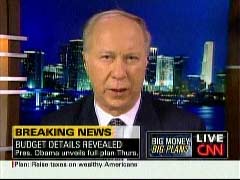 DAVID GERGEN: That's -- that's going to be a very good question, Anderson, and I -- I think one of the big questions about the president's speech last night -- a rousing speech, took us up to the mountaintops -- but I think a lot of people are now going to look at this and say, we need to focus on the recession first. We need to stabilize the economy. Once we have done that, let's then see where we can go on health care and -- and -- and energy and these other issues. And do we really want to now pass a 600 and -- for whatever this huge number -- over $600 billion? One of the surprises in Ed Henry's report -- and I can't believe that this is a deep view in the White House, but he reported that -- that people in the White House are saying -- working on the recession over the next six months is not all that important. What's really important is to do health care and energy. That is not the view of the country. So, you know, we went up to the mountaintop last night -- very successful speech. Today, we get down to some hard realities. There are going to be a lot more questions ahead. DAVID GERGEN: That's -- that's going to be a very good question, Anderson, and I -- I think one of the big questions about the president's speech last night -- a rousing speech, took us up to the mountaintops -- but I think a lot of people are now going to look at this and say, we need to focus on the recession first. We need to stabilize the economy. Once we have done that, let's then see where we can go on health care and -- and -- and energy and these other issues. And do we really want to now pass a 600 and -- for whatever this huge number -- over $600 billion? One of the surprises in Ed Henry's report -- and I can't believe that this is a deep view in the White House, but he reported that -- that people in the White House are saying -- working on the recession over the next six months is not all that important. What's really important is to do health care and energy. That is not the view of the country. So, you know, we went up to the mountaintop last night -- very successful speech. Today, we get down to some hard realities. There are going to be a lot more questions ahead.
  Meredith Vieira Cites 'Conservative' Meredith Vieira Cites 'Conservative'
David Brooks to Bash Jindal
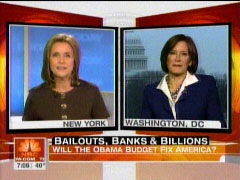 On Thursday's Today show, NBC's Meredith Vieira invited on former George W. Bush assistant Mary Matalin to discuss the excessive spending in Barack Obama's budget, and the interview got off to a promising start as Vieira actually asked Matalin: "Do you see it as a disaster in the making?" However the segment quickly turned sour when Vieira cited a critique of Bobby Jindal's post-Obama address response by New York Times columnist David Brooks and claimed: "Conservatives were criticizing him for stale ideas. He didn't say anything, nothing new."
On Thursday's Today show, NBC's Meredith Vieira invited on former George W. Bush assistant Mary Matalin to discuss the excessive spending in Barack Obama's budget, and the interview got off to a promising start as Vieira actually asked Matalin: "Do you see it as a disaster in the making?" However the segment quickly turned sour when Vieira cited a critique of Bobby Jindal's post-Obama address response by New York Times columnist David Brooks and claimed: "Conservatives were criticizing him for stale ideas. He didn't say anything, nothing new."
[This item, by the MRC's Geoffrey Dickens, was posted Thursday morning on the MRC's blog, NewsBusters.org: newsbusters.org ]
Matalin defended the Louisiana governor as seen in the following exchange:
MEREDITH VIEIRA: You know, you talk about a united Republican Party, but I want to read to you something that David Brooks said, now he's a conservative columnist. This was after governor Bobby Jindal gave the response to President Obama's speech on Tuesday. Brooks said, "To come up at this moment in history with a stale "Government is the problem. We can't trust the federal government." It's just a disaster for the Republican Party. The country is in a panic right now." And he went on to suggest that the party is out of touch with where this country is and where it is headed. So, you do not agree with what he said?
MARY MATALIN: No, I don't, and I live in Louisiana now, as you know, and Bobby Jindal is an extraordinary public servant. He's the greatest public policy innovator in the country today, and that isn't what he said. That's David Brook's rendition of it. Who, who's a friend. But his, Bobby Jindal has made more progress in Louisiana in the shortest period of time in the history of the state and probably in the country. Education reform and, and ethics reform. Everything that put Louisiana downscale is now one of the top states in the country. What people who are objecting to, about Governor Jindal's presentation was the presentation itself. And you know, demonstrably he was much stronger on Meet the Press and much stronger on the "Today" show than he was in front of a teleprompter. I think if you want to take the measure of a man, I'd rather see him be able go up against you than stand in front of a teleprompter.
VIEIRA: But you know Mary it wasn't just that. It was, again conservatives were criticizing him for stale ideas. He didn't say anything, nothing new.
MATALIN: No, these are not stale ideas. These are the essence of the, of fiscal conservatism upon which this country was founded and prospered and he is applying in, in the state of Louisiana. What is an old idea that's never worked in the history of this country or any other is government growing, which does not create wealth. It discourages investment and wealth creation. And the, they call, they're calling those ideas stale, but those are the only ones in the history of this country that have created prosperity. It worked for Kennedy, it worked for Reagan, it worked, it got us out of the last recession, and it's the only thing that's gonna grow this economy again.
  MSNBC's David Shuster Touts Jindal as MSNBC's David Shuster Touts Jindal as
Beavis and Butt-head Insult
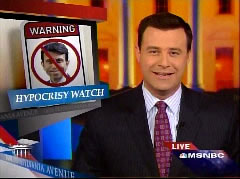 MSNBC's 1600 Pennsylvania Avenue host David Shuster on Wednesday delighted in a comparison of Louisiana Governor Bobby Jindal to the MTV characters Beavis and Butt-head. Shuster singled out the Republican, who gave the GOP response to Barack Obama's February 24 congressional address, in his "hypocrisy watch" segment.
MSNBC's 1600 Pennsylvania Avenue host David Shuster on Wednesday delighted in a comparison of Louisiana Governor Bobby Jindal to the MTV characters Beavis and Butt-head. Shuster singled out the Republican, who gave the GOP response to Barack Obama's February 24 congressional address, in his "hypocrisy watch" segment.
The MSNBC host slammed "Jindal's hypocrisy" for criticizing what he called wasteful spending, including volcano monitoring. (According to Shuster, Jindal is a hypocrite because, while the governor attacked volcano monitoring, he's also asked for comprehensive flood and hurricane funds for his own state.) The anchor gleefully recounted an attack by liberal New York Times writer Paul Krugman. Reading from Krugman's column, he recited: "The intellectual incoherence is stunning. The party of ideas has become the party of Beavis and Butt-head." Agreeing with the juvenile insult, Shuster added: "Beavis and Butthead? Well, Krugman didn't say which one Jindal is. Nonetheless, all of us at 1600 agree with the larger point."
[This item, by the MRC's Scott Whitlock, was posted Thursday morning on the MRC's blog, NewsBusters.org: newsbusters.org ]
Shuster concluded his commentary by asserting, "Governor Jindal, when you ask the federal government to help protect your state against natural disasters and then you criticize the federal government for trying to protect other states, that's hypocrisy, and it's wrong."
A transcript of the February 25 segment, which aired at 6:25pm EST follows:
DAVID SHUSTER: Last night in his Republican response to the President's address, Louisiana Governor Bobby Jindal criticized some of the spending in the President's economic recovery plan. And that takes us to tonight's "hypocrisy watch." First, the background. Governor Jindal last night took issue with the $787 billion bill that was signed last week and he described several spending items as wasteful.
BOBBY JINDAL: And $140 million for something called volcano monitoring. Instead of monitoring volcanoes, what Congress should be monitoring the eruption of spending in Washington, D.C.
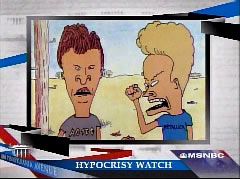 SHUSTER: First of all, monitoring active volcanoes helps local governments in Alaska and Hawaii get people out of the way when the time comes. It also helps those communities minimize damage. Secondly, just six months ago, Governor Jindal urged Congress and the Bush administration to allocate hundreds of millions of dollars for hurricane protection. In a letter to congressional leaders, Jindal wrote, quote, "It is critical that we provide comprehensive flood and hurricane protection including both coastal restoration and levee protection for Louisiana's entire coast." New and improved levees for Louisiana's entire coast? Governor Jindal acknowledged his request would cost $100 million. Engineers said it would be a billion dollars. Now, there's nothing wrong with building hurricane levees for Louisiana or monitoring volcanoes in Hawaii and Alaska.. Both programs create jobs and serve the greater good by possibly saving lives. The problem is Jindal's hypocrisy. Today, Nobel Prize winning- Nobel Prize winning economist Paul Krugman wrote, "The intellectual incoherence is stunning. The party of ideas has become the party of Beavis and Butt-head." Beavis and Butt-head? Well, Krugman didn't say which one Jindal is. Nonetheless, all of us at "1600" agree with the larger point. Governor Jindal, when you ask the federal government to help protect your state against natural disasters and then you criticize the federal government for trying to protect other states, that's hypocrisy, and it's wrong. SHUSTER: First of all, monitoring active volcanoes helps local governments in Alaska and Hawaii get people out of the way when the time comes. It also helps those communities minimize damage. Secondly, just six months ago, Governor Jindal urged Congress and the Bush administration to allocate hundreds of millions of dollars for hurricane protection. In a letter to congressional leaders, Jindal wrote, quote, "It is critical that we provide comprehensive flood and hurricane protection including both coastal restoration and levee protection for Louisiana's entire coast." New and improved levees for Louisiana's entire coast? Governor Jindal acknowledged his request would cost $100 million. Engineers said it would be a billion dollars. Now, there's nothing wrong with building hurricane levees for Louisiana or monitoring volcanoes in Hawaii and Alaska.. Both programs create jobs and serve the greater good by possibly saving lives. The problem is Jindal's hypocrisy. Today, Nobel Prize winning- Nobel Prize winning economist Paul Krugman wrote, "The intellectual incoherence is stunning. The party of ideas has become the party of Beavis and Butt-head." Beavis and Butt-head? Well, Krugman didn't say which one Jindal is. Nonetheless, all of us at "1600" agree with the larger point. Governor Jindal, when you ask the federal government to help protect your state against natural disasters and then you criticize the federal government for trying to protect other states, that's hypocrisy, and it's wrong.
  Garofalo: 'Self-Loathing' Steele, Eva Garofalo: 'Self-Loathing' Steele, Eva
Braun Types Like Limbaugh
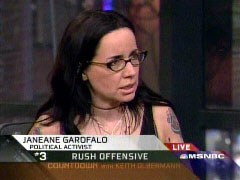 On Thursday's Countdown show, left-wing actress and comedienne Janeane Garofalo appeared to talk about a recent poll finding that Rush Limbaugh is substantially less popular with women than with men. Evoking laughter from MSNBC host Keith Olbermann, Garofalo remarked that "the type of female that does like Rush is the same type of woman that falls in love with prisoners." After citing serial killers Richard Ramirez and Charles Manson, she then compared women who like Limbaugh to Adolf Hitler's girlfriend, Eva Braun: "Eva Braun, Hitler's girlfriend. That is exactly the type of woman that responds really well to Rush."
On Thursday's Countdown show, left-wing actress and comedienne Janeane Garofalo appeared to talk about a recent poll finding that Rush Limbaugh is substantially less popular with women than with men. Evoking laughter from MSNBC host Keith Olbermann, Garofalo remarked that "the type of female that does like Rush is the same type of woman that falls in love with prisoners." After citing serial killers Richard Ramirez and Charles Manson, she then compared women who like Limbaugh to Adolf Hitler's girlfriend, Eva Braun: "Eva Braun, Hitler's girlfriend. That is exactly the type of woman that responds really well to Rush."
After mentioning that former CNN anchor Daryn Kagan used to date Limbaugh, Garofalo cracked that Kagan has Stockholm Syndrome, which she also attributed to RNC Chairman Michael Steele, with Olbermann agreeing that Steele suffers from "self-loathing."
GAROFALO: She dated him, so either she suffers from Stockholm Syndrome -- a lot like Michael Steele, who's the black guy in the Republican party who suffers from Stockholm Syndrome, which means you try and curry favor with the oppressor.
OLBERMANN: Yes, you talk about self-loathing.
GAROFALO: Yeah, and there's, any female or person of color in the Republican party is struggling with Stockholm Syndrome.
[This item, by the MRC's Brad Wilmouth, was posted Thursday night on the MRC's blog, NewsBusters.org: newsbusters.org ]
Below is a transcript of relevant comments from the Thursday, February 26 Countdown show on MSNBC:
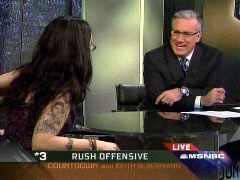 JANEANE GAROFALO: But the type of female that does like Rush is the same type of woman that falls in love with prisoners. [KEITH OLBERMANN LAUGHS] You know what I mean? They â€" like Richard Ramirez or Squeaky Fromme is a good example. I think Charles Manson's -- Eva Braun, Hitler's girlfriend. That is exactly the type of woman that responds really well to Rush. And there will be some Eva Brauns, Squeaky Frommes out there that will respond really well to this cattle call right now.
JANEANE GAROFALO: But the type of female that does like Rush is the same type of woman that falls in love with prisoners. [KEITH OLBERMANN LAUGHS] You know what I mean? They â€" like Richard Ramirez or Squeaky Fromme is a good example. I think Charles Manson's -- Eva Braun, Hitler's girlfriend. That is exactly the type of woman that responds really well to Rush. And there will be some Eva Brauns, Squeaky Frommes out there that will respond really well to this cattle call right now.
...
GAROFALO, REFERRING TO DARYN KAGAN: She dated him, so either she suffers from Stockholm Syndrome â€" a lot like Michael Steele, who's the black guy in the Republican party who suffers from Stockholm GAROFALO: Syndrome, which means you try and curry favor with the oppressor.
OLBERMANN: Yes, you talk about self-loathing.
GAROFALO: Yeah, and there's, any female or person of color in the Republican party is struggling with Stockholm Syndrome.
  CBS's Early Show: Junk Food Ban/Tax Needed CBS's Early Show: Junk Food Ban/Tax Needed
to Prevent Cancer
 On Thursday's CBS Early Show, correspondent Richard Roth reported on a new cancer study that found that obesity can increase the likelihood of getting cancer: "Aside from avoiding smoking, the report says that maintaining a healthy lifestyle is the most important thing you can do for cancer prevention. That means diet, physical activity, and weight management...The report recommends laws and policy changes by government, industry, and schools, from adding bicycle lanes to public roads to banning junk food from vending machines." Following Roth's report, co-host Julie Chen spoke with Dr. Ezekiel Emanuel, an oncologist and brother of White House Chief of Staff Rahm Emanuel, and asked: "In light of this report, how big of a role do you think government should play in making sure Americans lead a healthier lifestyle?"
On Thursday's CBS Early Show, correspondent Richard Roth reported on a new cancer study that found that obesity can increase the likelihood of getting cancer: "Aside from avoiding smoking, the report says that maintaining a healthy lifestyle is the most important thing you can do for cancer prevention. That means diet, physical activity, and weight management...The report recommends laws and policy changes by government, industry, and schools, from adding bicycle lanes to public roads to banning junk food from vending machines." Following Roth's report, co-host Julie Chen spoke with Dr. Ezekiel Emanuel, an oncologist and brother of White House Chief of Staff Rahm Emanuel, and asked: "In light of this report, how big of a role do you think government should play in making sure Americans lead a healthier lifestyle?"
Emanuel suggested: "...do you tax high fructose corn syrup in drinks that we know add calories and promote cancer?...we know that by better policies, we can encourage people to eat less and increase their exercise, which will have an effect, not just on cancer, but also heart disease and diabetes and other health-related activities."
[This item, by the MRC's Kyle Drennen, was posted Thursday afternoon on the MRC's blog, NewsBusters.org: newsbusters.org ]
Chen pressed Emanuel to be more definitive about the need for taxes on certain foods: "You say 'maybe do we tax them?' I mean, should we tax these manufacturers that are putting all these things in their products that make it taste good, but it's not good for us?" Emanuel replied: "There are other ways to do it besides taxing. But that is certainly one option that should be considered. In New York, they banned transfatty acids."
Emanuel even went on to compare taxes on junk food to the tax on tobacco: "You know, we've certainly gone a long way on the smoking front, and it's made a dramatic difference in this country. In 40 years we've cut the smoking rate in half. And we can do the same thing in terms of prevention, if we focus on diet and exercise." Chen went one step further, wondering if junk food should be banned all together from schools: "What about vending machines in schools? Should there be -- should we allow public schools to have vending machines?" On January 3, 2001, Chen was upset that junk food portions were being downsized: "So, I'm getting less chips, paying the same amount of money. Is that legal for them to do this?"
Read about Chen questioning the legality of fewer potato chips in the January 4, 2001 CyberAlert: www.mediaresearch.org
Agreeing with Chen, Emanuel declared: "...kids are not independent decision-makers. We know they're not the most rational people...And I think school is one place, I personally am disturbed that we allow these high fructose corn drinks, corn syrup drinks, and that we allow a lot of junk food in them."
Here is the full transcript of the February 26 segment:
7:00AM TEASE:
HARRY SMITH: Breaking news. A major study out this morning, one in every three cancer cases in the United States is actually preventable.
MARTIN WISEMAN: Together they, that is we, can help make reduction in cancer a reality.
SMITH: We'll tell you how you can stay cancer free.
7:02AM SEGMENT:
JULIE CHEN: First, a major new study out this morning says we can prevent cancer in our lives. Let's go to CBS News correspondent Richard Roth in London with the story. Richard, good morning.
RICHARD ROTH: Good morning, Julie. It's a joint study by leading American and British scientists. The authors are calling it the most systematic policy report ever on cancer prevention. And it's based on a review of existing studies about cancer risk and prevention. Aside from avoiding smoking, the report says that maintaining a healthy lifestyle is the most important thing you can do for cancer prevention. That means diet, physical activity, and weight management.
MARTIN WISEMAN [STUDY PROJECT DIRECTOR]: Your lifestyle, the ways of life that people follow are really dramatically important in determining their own cancer risk and, indeed, the different patterns of cancer that we found around the world.
ROTH: Overall, the study estimates about a third of the most common cancers in the U.S. could be prevented through lifestyle. It says that healthy eating, activity, and especially weight management, could prevent 38% of breast cancers in the U.S. and 45% of bowel cancers. Diet and exercise, of course, won't guarantee you won't get sick. Breast cancer survivor Jodie Cooper knows that.
JODIE COOPER: But it's very, you know, if it -- it's great if that helps prevent other cancers or cancers in other people. I think that's wonderful.
ROTH: The report recommends laws and policy changes by government, industry, and schools, from adding bicycle lanes to public roads to banning junk food from vending machines. But it also stresses cancer prevention, like health generally, is hugely dependent on personal choices, including some very small decisions we all make every day from what kinds of food we bring home from the supermarket to where we go out to eat. And even to whether we get there by car or bike or on foot. Julie.
CHEN: So true. Richard Roth, thanks, Richard. Joining us from Washington is Dr. Ezekiel Emanuel, an oncologist and director of bio-ethics at the National Institutes of Health. Good morning, Doctor.
EZEKIEL EMANUEL: Thanks for having me.
CHEN: Thanks for being on the show. In light of this report, how big of a role do you think government should play in making sure Americans lead a healthier lifestyle?
EMANUEL: Well, we have to make options available, as the report said, whether you close off Central Park, or in Washington, Rock Creek Park, on the weekends and allow people to run or walk or ride their bike, that's important. Whether you encourage supermarkets that keep fresh vegetables in the inner city or make farmers' vege -- farmer's markets available. Those are government policies. Similarly, do you tax high fructose corn syrup in drinks that we know add calories and promote cancer? So those are government policies. And we know that by better policies, we can encourage people to eat less and increase their exercise, which will have an effect, not just on cancer, but also heart disease and diabetes and other health-related activities.
CHEN: You say 'maybe do we tax them?' I mean, should we tax these manufacturers that are putting all these things in their products that make it taste good, but it's not good for us?
EMANUEL: Well, I think that's a policy choice that we have to make. There are other ways to do it besides taxing. But that is certainly one option that should be considered. In New York, they banned transfatty acids. You know, we've certainly gone a long way on the smoking front, and it's made a dramatic difference in this country. In 40 years we've cut the smoking rate in half. And we can do the same thing in terms of prevention, if we focus on diet and exercise.
CHEN: What about vending machines in schools? Should there be -- should we allow public schools to have vending machines?
EMANUEL: Now you're asking me all these ethical questions and not medical questions.
CHEN: Well, let me turn to this, what-
EMANUEL: Well, the ethical-
CHEN: Yeah, go ahead.
EMANUEL: Well, from the ethical standpoint, you know, kids are not independent decision-makers. We know they're not the most rational people. We have lots of data on that. And so we need to encourage them and encourage healthy eating habits and healthy exercise habits. And I think school is one place, I personally am disturbed that we allow these high fructose corn drinks, corn syrup drinks, and that we allow a lot of junk food in them. They're used to raise money. But that doesn't seem to me to be -- that's a short of short-term gain, raising money, as opposed to a long-term harm of increasing obesity.
CHEN: Let me ask you about this, what about all the people out there who live right, they're not obese, and they still get cancer?
EMANUEL: Yes. I mean, as I think the report made quite clear, it's not a guarantee. There are lots of things that cause cancer. We know radiation and other things. So it's not -- diet isn't the only thing, but it is a very big component, about a third to 40% of cancers are related to diet and exercise. That's a very big component. And then smoking is another big chunk. So those three items, eating right and eating fruits and vegetables, exercising regularly, and not smoking, go a long way towards preventing cancer. It's not a guarantee, but it certainly reduces your odds of getting cancer dramatically.
CHEN: Dr. Ezekiel Emanuel, thank you. For more information on this new cancer study, go to our website, earlyshow.cbsnews.com.
-- Brent Baker

Home | News Division
| Bozell Columns | CyberAlerts
Media Reality Check | Notable Quotables | Contact
the MRC | Subscribe
|






















 CNN personalities Jack Cafferty and David Gergen continued the chorus of praise for President Obama on Wednesday evening for his first address to a joint session of Congress, twenty-four hours after he had given it. During his regular "Question of the Hour" segment on The Situation Room, Cafferty gushed that the Democrat "had that place in the palm of his hand for the entire time he was in that room" and, despite all the serious issues he discussed during the speech, that the President "seems remarkably unruffled by all of this, serene in an inner confidence that he's got what it takes to lead this country back into the sunlight."
CNN personalities Jack Cafferty and David Gergen continued the chorus of praise for President Obama on Wednesday evening for his first address to a joint session of Congress, twenty-four hours after he had given it. During his regular "Question of the Hour" segment on The Situation Room, Cafferty gushed that the Democrat "had that place in the palm of his hand for the entire time he was in that room" and, despite all the serious issues he discussed during the speech, that the President "seems remarkably unruffled by all of this, serene in an inner confidence that he's got what it takes to lead this country back into the sunlight."  DAVID GERGEN: That's -- that's going to be a very good question, Anderson, and I -- I think one of the big questions about the president's speech last night -- a rousing speech, took us up to the mountaintops -- but I think a lot of people are now going to look at this and say, we need to focus on the recession first. We need to stabilize the economy. Once we have done that, let's then see where we can go on health care and -- and -- and energy and these other issues. And do we really want to now pass a 600 and -- for whatever this huge number -- over $600 billion? One of the surprises in Ed Henry's report -- and I can't believe that this is a deep view in the White House, but he reported that -- that people in the White House are saying -- working on the recession over the next six months is not all that important. What's really important is to do health care and energy. That is not the view of the country. So, you know, we went up to the mountaintop last night -- very successful speech. Today, we get down to some hard realities. There are going to be a lot more questions ahead.
DAVID GERGEN: That's -- that's going to be a very good question, Anderson, and I -- I think one of the big questions about the president's speech last night -- a rousing speech, took us up to the mountaintops -- but I think a lot of people are now going to look at this and say, we need to focus on the recession first. We need to stabilize the economy. Once we have done that, let's then see where we can go on health care and -- and -- and energy and these other issues. And do we really want to now pass a 600 and -- for whatever this huge number -- over $600 billion? One of the surprises in Ed Henry's report -- and I can't believe that this is a deep view in the White House, but he reported that -- that people in the White House are saying -- working on the recession over the next six months is not all that important. What's really important is to do health care and energy. That is not the view of the country. So, you know, we went up to the mountaintop last night -- very successful speech. Today, we get down to some hard realities. There are going to be a lot more questions ahead. 
 On Thursday's Today show, NBC's Meredith Vieira invited on former George W. Bush assistant Mary Matalin to discuss the excessive spending in Barack Obama's budget, and the interview got off to a promising start as Vieira actually asked Matalin: "Do you see it as a disaster in the making?" However the segment quickly turned sour when Vieira cited a critique of Bobby Jindal's post-Obama address response by New York Times columnist David Brooks and claimed: "Conservatives were criticizing him for stale ideas. He didn't say anything, nothing new."
On Thursday's Today show, NBC's Meredith Vieira invited on former George W. Bush assistant Mary Matalin to discuss the excessive spending in Barack Obama's budget, and the interview got off to a promising start as Vieira actually asked Matalin: "Do you see it as a disaster in the making?" However the segment quickly turned sour when Vieira cited a critique of Bobby Jindal's post-Obama address response by New York Times columnist David Brooks and claimed: "Conservatives were criticizing him for stale ideas. He didn't say anything, nothing new." 
 MSNBC's 1600 Pennsylvania Avenue host David Shuster on Wednesday delighted in a comparison of Louisiana Governor Bobby Jindal to the MTV characters Beavis and Butt-head. Shuster singled out the Republican, who gave the GOP response to Barack Obama's February 24 congressional address, in his "hypocrisy watch" segment.
MSNBC's 1600 Pennsylvania Avenue host David Shuster on Wednesday delighted in a comparison of Louisiana Governor Bobby Jindal to the MTV characters Beavis and Butt-head. Shuster singled out the Republican, who gave the GOP response to Barack Obama's February 24 congressional address, in his "hypocrisy watch" segment.  SHUSTER: First of all, monitoring active volcanoes helps local governments in Alaska and Hawaii get people out of the way when the time comes. It also helps those communities minimize damage. Secondly, just six months ago, Governor Jindal urged Congress and the Bush administration to allocate hundreds of millions of dollars for hurricane protection. In a letter to congressional leaders, Jindal wrote, quote, "It is critical that we provide comprehensive flood and hurricane protection including both coastal restoration and levee protection for Louisiana's entire coast." New and improved levees for Louisiana's entire coast? Governor Jindal acknowledged his request would cost $100 million. Engineers said it would be a billion dollars. Now, there's nothing wrong with building hurricane levees for Louisiana or monitoring volcanoes in Hawaii and Alaska.. Both programs create jobs and serve the greater good by possibly saving lives. The problem is Jindal's hypocrisy. Today, Nobel Prize winning- Nobel Prize winning economist Paul Krugman wrote, "The intellectual incoherence is stunning. The party of ideas has become the party of Beavis and Butt-head." Beavis and Butt-head? Well, Krugman didn't say which one Jindal is. Nonetheless, all of us at "1600" agree with the larger point. Governor Jindal, when you ask the federal government to help protect your state against natural disasters and then you criticize the federal government for trying to protect other states, that's hypocrisy, and it's wrong.
SHUSTER: First of all, monitoring active volcanoes helps local governments in Alaska and Hawaii get people out of the way when the time comes. It also helps those communities minimize damage. Secondly, just six months ago, Governor Jindal urged Congress and the Bush administration to allocate hundreds of millions of dollars for hurricane protection. In a letter to congressional leaders, Jindal wrote, quote, "It is critical that we provide comprehensive flood and hurricane protection including both coastal restoration and levee protection for Louisiana's entire coast." New and improved levees for Louisiana's entire coast? Governor Jindal acknowledged his request would cost $100 million. Engineers said it would be a billion dollars. Now, there's nothing wrong with building hurricane levees for Louisiana or monitoring volcanoes in Hawaii and Alaska.. Both programs create jobs and serve the greater good by possibly saving lives. The problem is Jindal's hypocrisy. Today, Nobel Prize winning- Nobel Prize winning economist Paul Krugman wrote, "The intellectual incoherence is stunning. The party of ideas has become the party of Beavis and Butt-head." Beavis and Butt-head? Well, Krugman didn't say which one Jindal is. Nonetheless, all of us at "1600" agree with the larger point. Governor Jindal, when you ask the federal government to help protect your state against natural disasters and then you criticize the federal government for trying to protect other states, that's hypocrisy, and it's wrong. 
 On Thursday's Countdown show, left-wing actress and comedienne Janeane Garofalo appeared to talk about a recent poll finding that Rush Limbaugh is substantially less popular with women than with men. Evoking laughter from MSNBC host Keith Olbermann, Garofalo remarked that "the type of female that does like Rush is the same type of woman that falls in love with prisoners." After citing serial killers Richard Ramirez and Charles Manson, she then compared women who like Limbaugh to Adolf Hitler's girlfriend, Eva Braun: "Eva Braun, Hitler's girlfriend. That is exactly the type of woman that responds really well to Rush."
On Thursday's Countdown show, left-wing actress and comedienne Janeane Garofalo appeared to talk about a recent poll finding that Rush Limbaugh is substantially less popular with women than with men. Evoking laughter from MSNBC host Keith Olbermann, Garofalo remarked that "the type of female that does like Rush is the same type of woman that falls in love with prisoners." After citing serial killers Richard Ramirez and Charles Manson, she then compared women who like Limbaugh to Adolf Hitler's girlfriend, Eva Braun: "Eva Braun, Hitler's girlfriend. That is exactly the type of woman that responds really well to Rush."  JANEANE GAROFALO: But the type of female that does like Rush is the same type of woman that falls in love with prisoners. [KEITH OLBERMANN LAUGHS] You know what I mean? They â€" like Richard Ramirez or Squeaky Fromme is a good example. I think Charles Manson's -- Eva Braun, Hitler's girlfriend. That is exactly the type of woman that responds really well to Rush. And there will be some Eva Brauns, Squeaky Frommes out there that will respond really well to this cattle call right now.
JANEANE GAROFALO: But the type of female that does like Rush is the same type of woman that falls in love with prisoners. [KEITH OLBERMANN LAUGHS] You know what I mean? They â€" like Richard Ramirez or Squeaky Fromme is a good example. I think Charles Manson's -- Eva Braun, Hitler's girlfriend. That is exactly the type of woman that responds really well to Rush. And there will be some Eva Brauns, Squeaky Frommes out there that will respond really well to this cattle call right now. 
 On Thursday's CBS Early Show, correspondent Richard Roth reported on a new cancer study that found that obesity can increase the likelihood of getting cancer: "Aside from avoiding smoking, the report says that maintaining a healthy lifestyle is the most important thing you can do for cancer prevention. That means diet, physical activity, and weight management...The report recommends laws and policy changes by government, industry, and schools, from adding bicycle lanes to public roads to banning junk food from vending machines." Following Roth's report, co-host Julie Chen spoke with Dr. Ezekiel Emanuel, an oncologist and brother of White House Chief of Staff Rahm Emanuel, and asked: "In light of this report, how big of a role do you think government should play in making sure Americans lead a healthier lifestyle?"
On Thursday's CBS Early Show, correspondent Richard Roth reported on a new cancer study that found that obesity can increase the likelihood of getting cancer: "Aside from avoiding smoking, the report says that maintaining a healthy lifestyle is the most important thing you can do for cancer prevention. That means diet, physical activity, and weight management...The report recommends laws and policy changes by government, industry, and schools, from adding bicycle lanes to public roads to banning junk food from vending machines." Following Roth's report, co-host Julie Chen spoke with Dr. Ezekiel Emanuel, an oncologist and brother of White House Chief of Staff Rahm Emanuel, and asked: "In light of this report, how big of a role do you think government should play in making sure Americans lead a healthier lifestyle?"